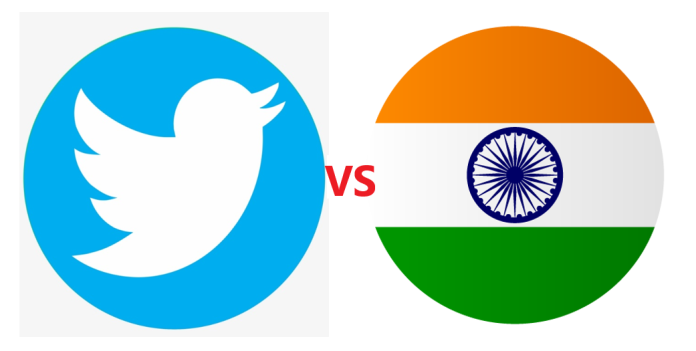ISLAMABAD, (APP): Twitter has challenged the Indian government over its orders to take down critical content on the social media platform, which the Washington Post believed would mark a “pivotal moment for internet speech around the world.”
Filed in the Karnataka High Court in Bangalore, Twitter’s petition challenges a recent order from the Indian government for the company to remove content and block dozens of accounts. Twitter complied with the order but then sought judicial relief.
In an opinion piece published Sunday, the Washington Post editorial board said the Indian Prime Minister Narendra Modi’s Bharatiya Janata Party had been chipping away at free expression online for some time, most notably with the passing of a law last year extending the executive’s censorship powers.
Under the law, the government can demand that news and information providers remove certain material within 36 hours of receiving a request, and it can initiate criminal proceedings against a designated company grievance officer located in the country if these mandates are rebuffed.
Invoking the same laws, Twitter’s top executive was summoned by police in one state for failing to take down a violent video; armed forces once showed up at the company’s offices as part of an investigation about a matter as anodyne as a tweet having been labeled “manipulated media.”
The company geographically restricted tweets from writers including Post Opinions contributor Rana Ayyub as well as advocacy organization Freedom House.
The decision put Twitter in a difficult position with local laws not reflecting its values on one side and the safety of its employees on the other.
Twitter’s petition argues that the government has tried to smother more tweets than the law authorizes. The platform also contends that authorities have failed to provide justification for their demands or to review past takedowns to ensure they remain necessary.
The Post said the case is, essentially, a test of whether free expression in India will continue to thrive — whether, when an unjust law unjustly applied makes it all but impossible for a company to protect speech, the judiciary will step in to protect it.
“This battle is not only about Twitter, and not only about India. Some countries have already imposed rules as restrictive as India’s revised code; others are considering it. The same goes for the so-called hostage-taking laws threatening employees that intimidate firms into closer cooperation. Not only social media companies should be resisting them. For all the responsibility Twitter may have to its users, or India’s government to its citizens, democracies around the world committed to civil liberties also have a duty to fight for the internet’s future,” the Post added.
In another article, the New York Times said, Twitter had been told by the Indian government to remove content related to complaints about civil liberties, protests, press freedoms, and criticisms of the government’s handling of the pandemic.
In the past, WhatsApp was also told that it would be required to make people’s private messages “traceable” to government agencies upon request which was also challenged and the case is pending.
Experts said the Indian government’s move to force Twitter to block accounts and posts amounted to censorship, at a time when the government is accused of weaponizing a loose definition of what content it finds offensive to go after critics, the NYT added.
[caption id="attachment_42112" align="aligncenter" width="696"]

enewspaper.com.pk/Journalists Association of America/Pak American Journalist's Club USA[/caption]
(Please send your news, article, or Pictorial to our email address <editor@enewspaper.com.pk & WhatsApp +923132434567 / +923332100737
PLEASE SEND YOUR COMMENTS Thanks)
(facebook ID shujaullahk) https://www.facebook.com/
Newspaper on Facebook: https://www.facebook.com/Enewspapercompk-182394028490643
(twitter: KhanShujaullah) https://www.twitter.com/home
(linkedin: shuja-ullah-khan) https://www.linkedin.com/feed/

 enewspaper.com.pk/Journalists Association of America/Pak American Journalist's Club USA[/caption]
(Please send your news, article, or Pictorial to our email address <editor@enewspaper.com.pk & WhatsApp +923132434567 / +923332100737
PLEASE SEND YOUR COMMENTS Thanks)
(facebook ID shujaullahk) https://www.facebook.com/
Newspaper on Facebook: https://www.facebook.com/Enewspapercompk-182394028490643
(twitter: KhanShujaullah) https://www.twitter.com/home
(linkedin: shuja-ullah-khan) https://www.linkedin.com/feed/
enewspaper.com.pk/Journalists Association of America/Pak American Journalist's Club USA[/caption]
(Please send your news, article, or Pictorial to our email address <editor@enewspaper.com.pk & WhatsApp +923132434567 / +923332100737
PLEASE SEND YOUR COMMENTS Thanks)
(facebook ID shujaullahk) https://www.facebook.com/
Newspaper on Facebook: https://www.facebook.com/Enewspapercompk-182394028490643
(twitter: KhanShujaullah) https://www.twitter.com/home
(linkedin: shuja-ullah-khan) https://www.linkedin.com/feed/
 PKR
PKR
